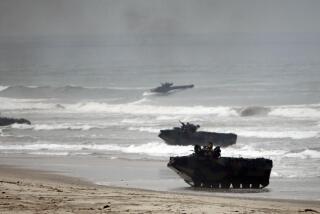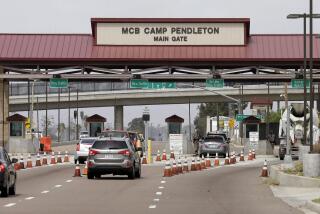An Emotional Day for Marines : Military: At Camp Pendleton, prayers, briefings and families dominate activities in preparation for deployment to Somalia.
In the middle of a Camp Pendleton service dedicated to Operation Restore Hope on Sunday morning, 22-year-old Lori Brefini turned to catch a glimpse of her 13-month-old daughter, playing happily behind the glass window of the chapel’s baby room.
Brefini laughed. Then she burst out crying.
Her husband is already off the coast of Somalia on a Navy ship--one of 1,800 Marines soon to be joined by thousands more--and Brefini’s fluctuating emotions were typical at the North County base, where more than 4,000 Marines await imminent deployment orders.
While a group of about 400 Marines slated to leave Sunday was delayed, possibly until Tuesday, the pace of preparation picked up as spouses were briefed on the logistics of separation, and supplies--including everything from toilet paper to water--continued to be packed and loaded onto military trucks.
While some treat the Somali operation as just another job, for some--like Brefini--the prospects of helping thousands who starve daily in the East African nation has softened the blow of a lonely Christmas season.
“I know it is for the good of mankind, and as Christians I think it is our job to do that,” she said after the Protestant service, which focused on maintaining hope in tough times. “But you have all those young warlords there. They are going to be blockading supplies. It scares me. And there are a lot of diseases.”
Her husband--Lance Cpl. Eric Brefini--has been gone since February, when their daughter was less than 3 months old. And, Lori Brefini doesn’t expect him to return until at least April 15. But most of the Camp Pendleton Marines headed for Somalia are still on base, living out of packed bags, taking care of last minute details, and waiting.
Of the 28,000 troops the United States has promised to send to Somalia to protect deliveries of humanitarian supplies, 16,000 will come from Southern California, and at least 4,000 will come from Camp Pendleton’s 1st Marine Expeditionary Force, said 1st Lt. Kevin Bentley, a base spokesman.
While the mission this time around is drastically different from that of operations Desert Storm and Desert Shield in the Persian Gulf, familiar stresses have set in for those who will be left behind.
Sunday, Marines and their spouses once again gathered to be briefed about the upcoming journey and to ask questions that covered everything from how to update wills and designate powers of attorney, to where to send mail and how to get news of newborn babies or dying parents through the Red Cross to troops cut off from modern communications in the strife-torn East African nation.
Once again, a system of “key wives” who contact other wives of Marines with news will kick into gear, and faith support services at the 16 chapels on base will soon begin, base officials said Sunday.
At the base theater, packets on “family readiness” and money management were handed out to hundreds of Marines and their families, who packed the auditorium for briefings.
Also available were coloring books titled “Daddy’s Days Away,” camouflage-covered booklets designed by a group of Marine wives to ease the pain for small children separated from their fathers.
“Many, many days will go by before Daddy comes home from his trip,” one section reads, suggesting that children keep a journal for Dad, get together with other children whose dads are deployed, and paste in photographs of memorable occasions Dad may miss.
“This is always hard,” said Maria Sanchez, flanked by her three young sons. “This time I think it is scary because we don’t know how long they will be gone. And I have got three boys who are going to torture me the minute he leaves,” she said of her husband.
Last time, her oldest son, 10, tried to jump out of the car after the boys had said goodby to their father, said Sanchez, who added that the boys tend to blame his absences on her.
For Lance Cpl. Brian Jackowitz, 19, the separation may hit him harder than his small daughter--only 5 weeks old. The uncertainty of when he will embark on his first overseas deployment, and just what he will be doing in Somalia, troubled him Sunday as he cradled his baby girl.
“I am a little bit nervous. I don’t know what is going on,” Jackowitz said. “We have no information. We are just like pawns.”
He and his 20-year-old wife, Kimberly, learned while watching CNN that Marines from Camp Pendleton would be deployed, and said they have felt cut off from any solid information about the operation.
That information was hard to come by Sunday.
While public affairs personnel said only small groups of Marines have already left Camp Pendleton for Somalia, and that there would be no deployments Sunday, another officer hinted at a night-time departure.
“A deployment can be very emotional for those left behind,” said one base officer speaking at a morning briefing. “There can be shock and denial. But believe me, it will happen. Some of us are leaving tonight.”
Meanwhile, Marines headed for Somalia continued to load pallets onto flatbed trucks that will taken to March and Norton Air Force bases to be loaded onto Air Force cargo planes, said 1st Lt. Mark Wesley, one of the men overseeing the loading effort.
“We are not counting on getting any support from the host nation, so we are having to bring everything with us,” said Wesley, as water, portable bathrooms, fire extinguishers, generators, ready-made meals, tents and more were loaded onto the pallets.
In the past week, 200 tons of supplies have been loaded at Camp Pendleton, he said.
While some Marines said they would follow orders and do their job with equal enthusiasm regardless of the mission, some took a larger view of what the U.S. military presence in Somalia may mean in years to come.
“It is actually nice to be able to do something that directly impacts other people. The bottom line is there are people who need help and we have an opportunity to help them,” said Lt. Ken Lasure, 31, of the 1st Combat Engineer Battalion.
Whether or not this type of mission will come to dominate the post-Cold War U.S. military activity could very well depend on success in Somalia, he added.
“Obviously, the U.N. and other countries getting involved will have to play a key role. Otherwise it’s going to be back to square one when we leave,” Lasure said. “But it’s good for (the military). It forces us to grow and expand our versatility, to give the country the most bang for its buck.”
But those familiar with Somalia added that the stark conditions will not be easy to get used to.
“Hot and windy and flies. That’s all I remember. And dusty,” said Staff Sgt. John Kitchen, who escorted media into Somalia for a month earlier this fall and will be going back any day now.
“The smells were just horrible. I wasn’t prepared for the shock of seeing so many bodies. In one area I remember counting 35 bodies in shallow graves.”
More to Read
Sign up for Essential California
The most important California stories and recommendations in your inbox every morning.
You may occasionally receive promotional content from the Los Angeles Times.











